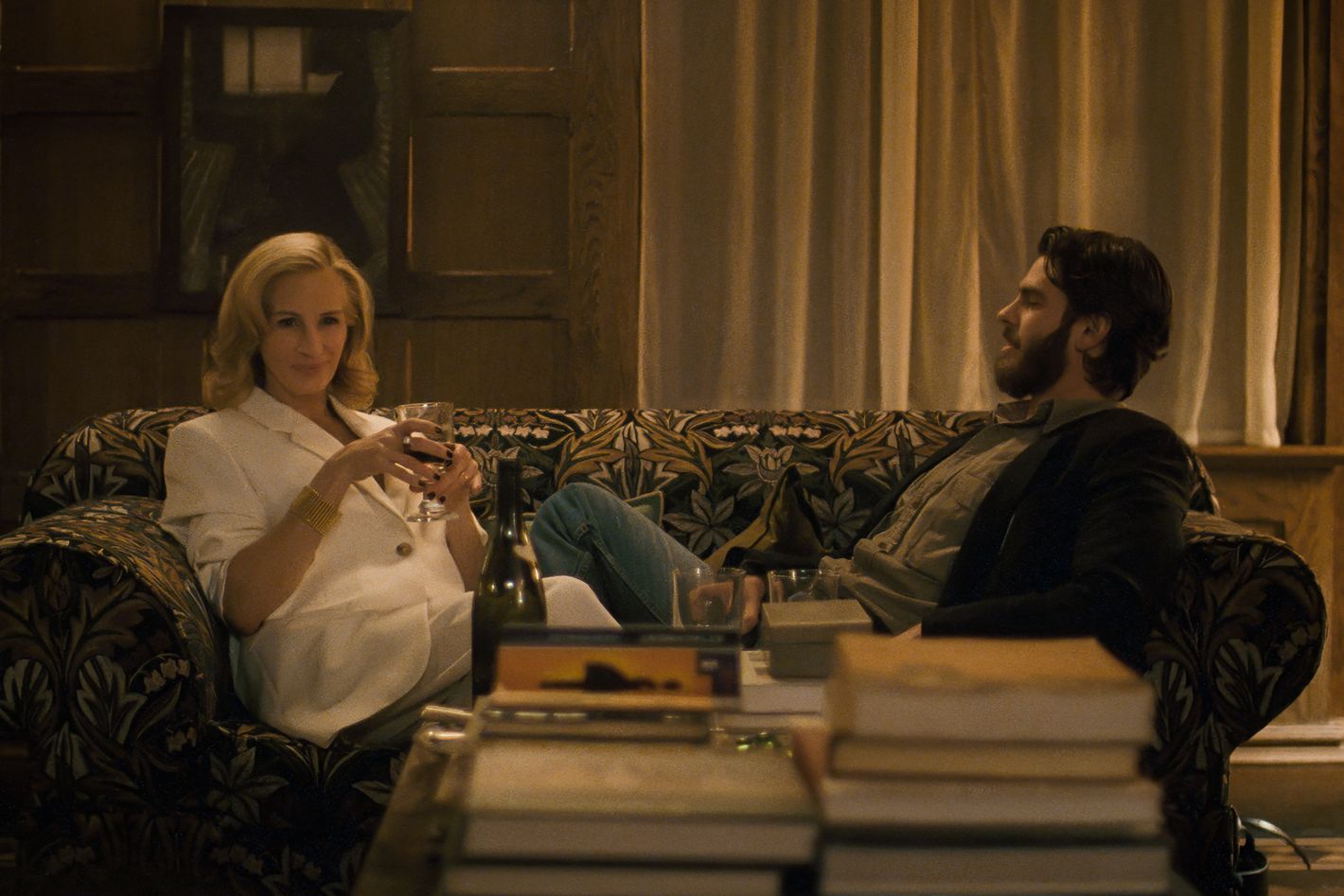
It is surely no coincidence that the credits for Luca Guadagnino’s After the Hunt are rendered in white Windsor Light Condensed letters over a black background, a.k.a. the “Woody Allen font,” while soft jazz music plays on the soundtrack. This is how Allen’s credits have looked for decades; even the way the cast and crew’s names have been grouped and presented here is distinctly Allenesque, making the allusion clearer. Is it an in-joke? A provocation? Guadagnino’s film seems to have been designed in a lab to tweak all our various sensitivities around cancel culture, so it really could be anything.
Or maybe the font is just denoting the cloistered lives of the people at this film’s center. There aren’t many characters in this movie who aren’t affiliated with Yale, certainly no major ones. Everybody is hurting on some level, but they’re also the types of people who have deep philosophical debates and pepper their conversation with high-minded references. The atmosphere of privilege in After the Hunt is so thick you could lose all sense of direction trying to navigate it.
The film follows what unfolds when a PhD student, Maggie Resnick (Ayo Edebiri), accuses a beloved philosophy professor, Hank Gibson (Andrew Garfield), of sexually assaulting her after a party thrown by Alma Imhoff (Julia Roberts), another professor in the department. Alma is entangled in the situation on multiple levels: She’s very close to Hank, who might be not so secretly in love with her, and she’s also close to Maggie, who might be slightly obsessed with her. As her psychoanalyst husband Frederik (Michael Stuhlbarg) observes, Alma likes to pluck, mold, and elevate people she finds interesting, and Maggie may well be one of them. Additionally, Alma and Hank are both up for tenure, and only one can be selected.
The accusation appears to bring up other memories for Alma — there’s an incident from her past that we learn about in bits and pieces over the course of the film — which might explain why she’s racked with paralysis in the wake of the news. Both Hank and Maggie expect Alma to side with them, but she’s unsure how to act; she’s careful around Hank, and downright standoffish with Maggie. It’s clear that the accusation has rendered Hank thoroughly toxic; he describes his colleagues as “wildebeest escaping from an approaching lion.” (He’s not the lion, by the way; he’s the wounded wildebeest that’s going to get eaten in the others’ stead.) But Alma has her doubts about Maggie as well, especially after Hank reveals that the girl’s accusation came after he discovered she had plagiarized her dissertation. Despite everyone’s initial fondness for Maggie, it soon emerges that they all consider her a mediocre student. Really, her primary virtue is the fact that her ultra-wealthy parents have already donated many millions to the university.
And because these people are academics — philosophy academics, at that — everyone is constantly talking about things like “the perceived existence of a collective morality,” “performative discontent,” panopticons, and whether the personal lives of the people whose works they teach would ever pass muster today. They also talk a lot about who gets elevated in today’s world, who gets listened to, who gets labeled a villain. One student tells Alma that she’s certain to get the tenure position over Hank because they’d never give it to a straight white man in this day and age. These make for interesting topics for discussion, but strangely enough, they don’t ultimately inform the matter at hand. Hank isn’t being accused of mere immorality, after all; he’s being accused of rape, which was also a crime back in Kierkegaard’s days.
After the Hunt is absorbing and well-acted, and Guadagnino ladles on the Ivy League atmosphere (the locations are very accurate to New Haven and Yale, although the film was shot in London, which is a CGI devilry I have trouble wrapping my head around), but despite its deliberate pacing and talky script, it’s not quite the heady intellectual drama it wants to be. It’s structured more like a mystery; the questions it raises are ones of guilt, innocence, and intent. Could Maggie’s accusation be revenge for Hank’s revelations about her thesis? Could it be the result of a kind of transitive jealousy, because Alma seems intimate with Hank in a way she isn’t with Maggie? Could it be a creepy re-enactment of something from Alma’s own past? Douglas Sirk could have made this movie, though he probably would have had a bit more fun with it.
After the Hunt works, though, mostly because the cast is uniformly excellent. It’s been a while since Roberts has had such a meaty role, and she gives Alma a stony anxiousness that adds to the frustrations of those around her: the more nervous Alma is, the less readable she becomes. She’s also suffering from a mystery ailment that seems to be tearing her stomach to pieces, suggesting that all these bottled-up emotions are finding new ways to express themselves. Garfield loads Hank with chummy physicality. He’s all bold statements and unbuttoned shirts and intimate whispers and affectionate contact. We can see how people can be drawn to him and also how he could wind up getting too close to them.
Meanwhile, Edebiri plays Maggie with a kind of wild-eyed apprehension, and when she talks about feeling marginalized as a Black woman, she comes off like she’s reciting a mantra rather than expressing a genuine thought. (She is, after all, the child of a billionaire.) Some will surely see that as the movie stacking the deck against Maggie, not to mention the other students around her, including her trans partner Alex (Lio Mehiel), whom Alma keeps misgendering. But this culture clash between the professors and the students is one way the film keeps us guessing: We have to question Maggie’s motives somewhat, otherwise there’d be no story.
Stuhlbarg is a particular standout as Alma’s long-suffering husband. He adores her and suspects she doesn’t adore him back. He spends his days cooking elaborate meals for her, listening to aggressive, atonal classical music. He accompanies these pieces with broad conducting gestures suggesting a fantasy of power, since he’s otherwise been so symbolically neutered. As we watch Frederik, who is mostly an observer to the story’s action, the film’s vision becomes clearer: Everyone in After the Hunt considers themselves a victim, despite the fact that they are all at the very top of society.
While the picture could have used more drive, perhaps one virtue of its bagginess is the space it creates to provoke. There will be some who dismiss After the Hunt right out of the gate, because they’ll see any attempt to address such issues as playing into the hands of cynical opportunists who reject progress precisely because it is progress. Then there will be those who adore it simply for daring to bring up such seemingly taboo matters. In truth, the movie seems engineered to let each viewer see what they want in it, both the good and the bad. (Me, I’m still stuck on the font.) After the Hunt might be confused, and it might even be unsatisfying — but it also refuses to coddle anyone, and that feels like some sort of victory.
More From the 2025 Venice Film Festival
